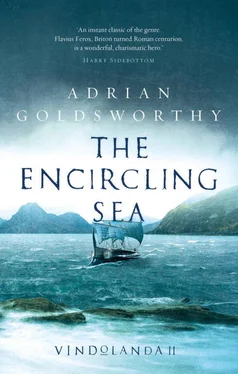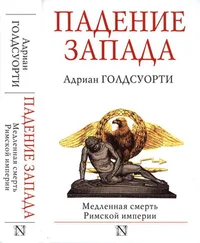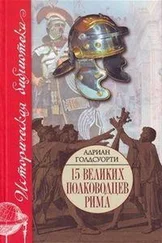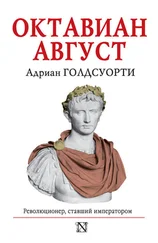Адриан Голдсуорти - The Encircling Sea
Здесь есть возможность читать онлайн «Адриан Голдсуорти - The Encircling Sea» весь текст электронной книги совершенно бесплатно (целиком полную версию без сокращений). В некоторых случаях можно слушать аудио, скачать через торрент в формате fb2 и присутствует краткое содержание. Город: London, Год выпуска: 2018, ISBN: 2018, Издательство: Head of Zeus, Жанр: Историческая проза, Прочие приключения, на английском языке. Описание произведения, (предисловие) а так же отзывы посетителей доступны на портале библиотеки ЛибКат.
- Название:The Encircling Sea
- Автор:
- Издательство:Head of Zeus
- Жанр:
- Год:2018
- Город:London
- ISBN:978-1-784-97816-7
- Рейтинг книги:5 / 5. Голосов: 1
-
Избранное:Добавить в избранное
- Отзывы:
-
Ваша оценка:
- 100
- 1
- 2
- 3
- 4
- 5
The Encircling Sea: краткое содержание, описание и аннотация
Предлагаем к чтению аннотацию, описание, краткое содержание или предисловие (зависит от того, что написал сам автор книги «The Encircling Sea»). Если вы не нашли необходимую информацию о книге — напишите в комментариях, мы постараемся отыскать её.
A FORT ON THE EDGE OF THE ROMAN WORLD cite cite
The Encircling Sea — читать онлайн бесплатно полную книгу (весь текст) целиком
Ниже представлен текст книги, разбитый по страницам. Система сохранения места последней прочитанной страницы, позволяет с удобством читать онлайн бесплатно книгу «The Encircling Sea», без необходимости каждый раз заново искать на чём Вы остановились. Поставьте закладку, и сможете в любой момент перейти на страницу, на которой закончили чтение.
Интервал:
Закладка:
One of the most famous letters is the invitation from Claudia Severa, wife of Aelius Brocchus at Coria (modern Corbridge), asking Sulpicia Lepidina, wife of Flavius Cerialis at Vindolanda, to attend her birthday celebration on 11 September. This formed the basis of the plot for the first novel. All of these people are real, but until the discovery of the tablets none were attested anywhere else. It is highly likely that objects excavated in the area of the praetorium of the third fort at Vindolanda belong to Cerialis and his family, for instance a fine decorated head-piece for his horse, fine shoes belonging to children and the broken and discarded slipper that surely belonged to Sulpicia Lepidina – all of which can be seen in the excellent museum at Vindolanda.
I have used the names of these real people in these novels, but in the main their characters are invented. There are snippets of information in the texts, and I have used as much of this as possible, and tried my best never to invent anything that would jar with what we do know, but even so their appearance and characters, let alone the events that befall them, are fiction. There is certainly no hint in the text that Cerialis’ and Sulpicia Lepidina’s tour at Vindolanda was as eventful as these stories make it. However, there is room for this because we really know very little about them and even less about what was happening in Britain at the time.
Cerialis was the prefect of cohors VIIII Batavorum milliaria equitata (the ninth double-strength Batavian regiment of infantry and cavalry), which at full strength ought to have numbered over a thousand men, a quarter of them cavalry. He was a Roman citizen and a member of the equestrian order, the social class ranking below the Senate. To give an idea of scale, there were tens of thousands of equestrians compared to around six hundred senators. We do not know even the names of the majority of senators in this or most other eras, so it is unsurprising that even fewer equestrians have left any clear trace of their lives. The Vindolanda tablets give us a hint of the vast amount of writing and record keeping in the Roman world, but also remind us that it takes exceptional good luck for such material to survive into the modern era.
An equestrian prefect in command of an infantry cohort or cavalry ala of auxiliary soldiers was a man of considerable importance locally and in his home community. Substantial property was required for a man to be registered as an equestrian in the census. However, by AD 100 there were at least 350 posts as commander of auxiliary units. We think that the average time spent by these officers with a unit was about three years (although there is a lot of guesswork in this), which shows how many of these officers there were and why we should not be surprised that such a small proportion appear in our sources. Cerialis is one of the best documented, and we really know little about him.
His name suggests that he, like the soldiers he commanded, was a Batavian, a Germanic tribe living in what is now the Netherlands. In AD 70 the Batavians revolted as part of the wider civil war and disturbances following the deposition and suicide of Nero. The Civil War was won by the Emperor Vespasian, whose family name was Flavius. The commander he sent to defeat the Batavian rebels was Petilius Cerialis, a task he completed by AD 71. We do not know what happened to Julius Civilis, the rebel leader, for the sources for the end of the rebellion are poor. The combination of Flavius and Cerialis as names strongly suggest that either the prefect at Vindolanda or his father were granted Roman citizenship during or after the rebellion. Presumably the man who was rewarded in this way either remained loyal to Rome (and specifically Vespasian) throughout the revolt, or changed sides early enough to be treated well by the new emperor. Although it is possible that the prefect at Vindolanda was middle-aged, old enough to have attracted attention during the disturbances of AD 70, it seems much more likely that he was the second generation of the family to be a Roman citizen.
Equestrian status came from property, while a command in the army came from influence with those in high places. An old treaty with the Batavians stipulated that they should not pay tax to Rome, but instead provide soldiers for the auxilia , but that these men would serve under their own aristocrats. The appearance of Cerialis at Vindolanda shows that this continued to be the case after AD 70, although there are hints that it ceased during the course of the second century AD. There is a hint that Cerialis came from the royal bloodline of the tribe, like Civilis.
Sulpicia Lepidina is only known through the tablets and it is impossible to say anything definite about her family. The daughter of a senator is attested as the wife of an equestrian prefect on the British frontier later in the second century AD, so such marriages did occur, although they were rare. Neither is anything known about Brocchus, Claudia Severa, Rufinus and other names from the tablets who have become characters in the story. Being a Roman citizen and an equestrian did not require any Italian, let alone Roman, blood and such people came from all over the empire. In language and culture they were primarily, sometimes exclusively ‘Roman’, and they were Roman in law. That did not mean that, like Cerialis, they might also be part of a different ethnic tradition.
Claudius Super is almost a character from the tablets. There is a man who appears to have equestrian status and also to be a centurio regionarius , but he is Clodius Super. When writing the first novel I did not check my notes carefully and it was only after it was finished that I realised I had turned him into a Claudius rather than Clodius. By then it was too late to change, so Claudius he stayed. Some equestrians served as centurions in the legions rather than prefects of auxiliary units, whether because they wanted to spend a longer time in the army, could not afford the lifestyle of a cohort commander, or did not have friends influential enough to secure them the more senior post.
The name Crispinus appears in the tablets and he may be a tribune with a legion, but the character is otherwise an invention. Neratius Marcellus was the governor or legate of Britannia at this time and is also mentioned in the tablets. The poet Martial wrote to his friend Quintus Ovidius when the latter was about to accompany a friend going to govern Britain, and there is a good chance that this was Marcellus. He was a poet and philosopher (possibly a Stoic), and may have been exiled under Vespasian and later recalled.
Ferox and Vindex are wholly invented, although a later tombstone records a Brigantian soldier in the Roman army who was the son of someone named Vindex and in my imagination this is our man. It was common for the Romans to take boys from defeated peoples, educate them and grant them citizenship, sometimes even equestrian status, and make them army officers. This was part of the process of absorbing former enemies. It is not directly attested as happening after the defeat of the Silures (who lived in what is now South Wales) in the seventies AD, but is perfectly plausible.
Legionary centurions are often still depicted as sergeant-major types, tough men who rose through the ranks through sheer talent after long and hard service. The stereotype is a powerful one, but is not based on good evidence. Some centurions were commissioned directly from civilian life without any prior military experience, including a minority of equestrians. A few proudly tell us on monuments, most often their tombstones, that they joined as ordinary soldiers, but these are very few. The vast majority of recorded centurions give no indication of having served in lower ranks. Others served only as junior officers before being elevated to the centurionate. It is important to remember that a centurion had to be well educated, literate and numerate, for the army ran on the written word. These men were professional officers, rather than professional soldiers, and their pay and conditions were substantially higher than those of men in the ranks. It is likely that even junior centurions earned more than ten times the salary of an ordinary soldier, and most were probably drawn from the local gentry and well-off families of Italy and the provinces.
Читать дальшеИнтервал:
Закладка:
Похожие книги на «The Encircling Sea»
Представляем Вашему вниманию похожие книги на «The Encircling Sea» списком для выбора. Мы отобрали схожую по названию и смыслу литературу в надежде предоставить читателям больше вариантов отыскать новые, интересные, ещё непрочитанные произведения.
Обсуждение, отзывы о книге «The Encircling Sea» и просто собственные мнения читателей. Оставьте ваши комментарии, напишите, что Вы думаете о произведении, его смысле или главных героях. Укажите что конкретно понравилось, а что нет, и почему Вы так считаете.












